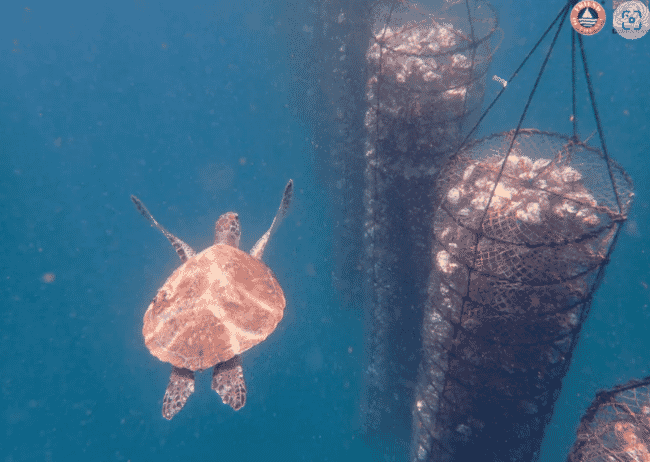
The company has committed to developing a business model based on respect for the environment, according to Friend of the Sea © Friend of the Sea
The company, created by CEO Ramie Murray, accomplished the challenge of introducing the Pacific cupped oysters, originally from Japan, into Emirati waters. Dibba Bay buys spats from hatcheries around the world, seeds them in an oyster nursery, and places them in lanterns before lowering them into the water. The oysters grow without any feed or chemical substances, relying on the natural environment rich in phytoplankton.
Pacific oysters are traditionally grown in the cooler waters of Europe, North America and East China, the world’s biggest producers of the shellfish. However, its creation in 2016 marked the Dibba Bay oyster farm as the first aquaculture project of its kind in the region.
Early on, the company committed to developing a business model based on respect for the environment. This has earned Dibba Bay the Friend of the Sea certification, recognising that its aquaculture facilities meet strict sustainable policies, waste management regulations and social responsibilities.
The certification also covers the traceability of Dibba Bay’s packing and export operations, as 50 percent of the company’s production is exported to Hong Kong, the Maldives, Mauritius, Seychelles, Oman and other destinations.
“Our mission as an oyster farm has always been to protect our oceans and involve sustainable practices in all aspects of our business to safeguard the integrity of aquatic life. We are proud to be acknowledged by Friend of the Sea for our sustainable farming practices. It’s important to us that there is an accredited third party certifying our work; sustainability demonstrated with a third-party certification will help consumers choose more consciously,” said Ramie Murray, founder and CEO of Dibba Bay oysters, in a press release.
Friend of the Sea’s Sustainable Aquaculture Certification criteria includes no impact on critical habitat, compliance with water quality parameters, no use of harmful antifouling or growth hormones, compliance with water quality management, social accountability, and continuous improvement of waste and energy management.
Dibba Bay oyster farm is also involved in supporting conservation efforts, such as a project to recreate coral reef ecosystems with oyster shells to provide a new habitat for marine species.
“Obtaining this certificate proves not only that Dibba Bay conducts a responsible farming operation according to Friend of the Sea standards, but also that the company has a broader commitment to protecting the environment,” said Paolo Bray, founder and director of Friend of the Sea.


